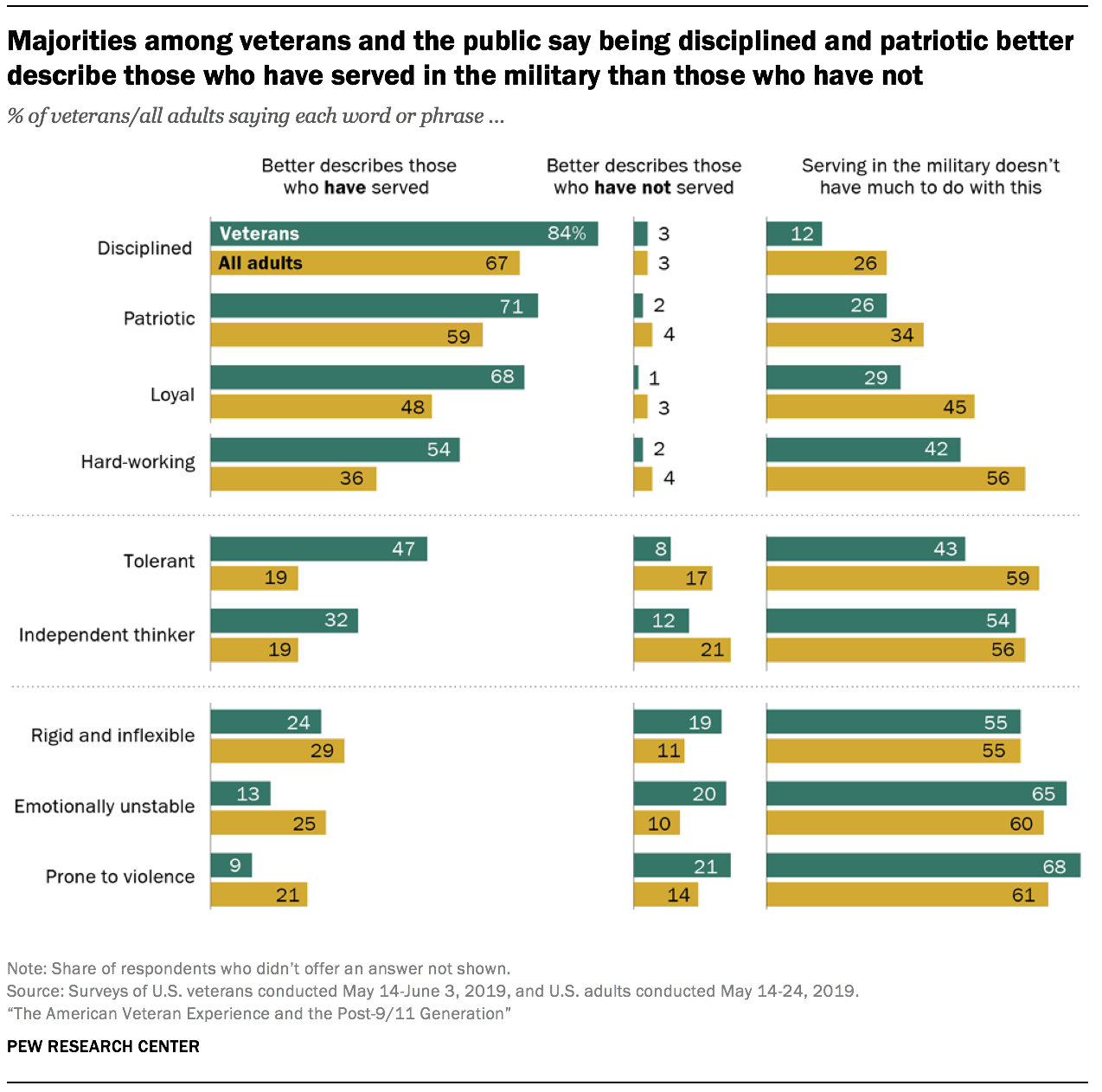Large shares among veterans and the U.S. public say people who have served in the military are more disciplined, patriotic and loyal than those who have not served. And about a third or more in both groups say veterans are more hard-working. Still, when it comes to things like being tolerant and open to all groups, the public is less likely to see this as a trait associated with military service than veterans are themselves.

Fully 84% of veterans and 67% of all adults say the term “disciplined” better describes people who have served in the military. Roughly one-quarter of all adults (26%) and 12% of veterans say that serving in the military does not have much to do with this trait. Just 3% of both groups say being disciplined better describes people who have not served in the military.
Similarly, about seven-in-ten veterans (71%) and 59% of adults say “patriotic” better describes people who have served in the military. About one-quarter of veterans (26%) and 34% of adults say being patriotic has little to do with military service. Here again, small shares say this trait better describes people who have not served in the military (2% of veterans and 4% of the public).
While a majority of veterans (54%) say the term “hard-working” better describes those who have served in the military, a majority of the public (56%) says this characteristic is not necessarily related to military background. About a third (36%) of all adults say this trait better describes those who served in the military. Small shares of veterans (2%) and the public (4%) say hard-working better describes those who have not been in the military.
The pattern is similar when it comes to loyalty. About seven-in-ten veterans (68%) say being “loyal” better describes those who have served in the military than those who haven’t. Among the public, 48% say this trait better describes military veterans, but roughly the same share (45%) says serving in the military doesn’t have much to do with being loyal. Again, very few veterans (1%) or members of the public (3%) say loyalty better describes those who have not served in the military.
Veterans and the public are especially divided in thinking about tolerance and openness. While 47% of veterans say being “tolerant and open to all groups of people” better describes those who have served in the military than those who have not, just 19% of all adults say the same – a 28 percentage point gap. Roughly six-in-ten adults (59%) say being in the military has nothing to do with tolerance, as do 43% of veterans. Among all adults, 17% say being tolerant better describes those who have not been in the military; 8% of veterans say the same.
There are several traits and characteristics that majorities of both veterans and the public say have little to do with having served in the military. One such trait is being an “independent thinker.” Some 54% of veterans and 56% of all adults say serving in the military doesn’t have much to do with this. Among those who do see a military-civilian difference on this trait, veterans are more likely to say this better describes those who have served in the military, while the public is more evenly divided.
Similarly, when it comes to being “rigid and inflexible,” more than half of veterans and the public (55% each) say being in the military has nothing to do with this. About one-quarter of veterans (24%) say being rigid and inflexible better describes those who have served in the military; a similar share of all Americans say the same (29%). Still, roughly two-in-ten veterans (19%) say being inflexible better describes those who have not been in the military, compared with 11% of all Americans.
Most veterans and members of the public say that being “emotionally unstable”and being “prone to violence” are traits that are not related to having been in the military. In both cases, the public is more likely to associate these traits with those who have served in the military than veterans are. One-in-four adults say being emotionally unstable better describes those who have served in the military than those who haven’t, and 21% say the same about being prone to violence. Smaller shares of the public say these traits better describe those who haven’t served. Just the opposite is true of veterans – they are more likely to see these traits as associated with those who have not served in the military.




